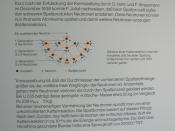Summary Paper
A Woman's Curse?
"Why do cultures the world over treat menstruating women as taboo?
An anthropologist offers a new answer - and a challenge to Western
ideas about contraception"
A Woman's Curse?, Meredith F. Small, The Sciences, Jan/Feb 1999, pp. 24-29.
In almost all mammals, menstruation does not occur; the discarded uterine lining is simply reabsorbed into the body if fertilization does not take place. In humans, as well as some higher primates, some of the shed endometrium is not reabsorbed, but discharged through the vaginal opening. The fact that menstruation is not common amongst mammals suggests that it must confer an evolutionary advantage specific to higher primates and humans. Meredith F. Small discusses how menstruation can be advantageous, by examining a study, by Beverly I. Strassmann, of the Dogon people of West Africa.
Throughout the world, menstruation seems to invoke primarily negative responses. In an effort to find the reason behind this, Strassmann spent over two years compiling data in the first long term study on behaviours towards, and beliefs about, menstruation in a traditional society.
This data led her to propose a new theory of why menstruation evolved as it did, which is, essentially, a story of conserving resources. In fact, Strassmann estimates that "...a woman can save about six days' worth of energy for every four nonconceptive cycles." Obviously, this would prove useful to early hunter/gatherers, and give them an evolutionary advantage.
In evolution, the name of the game is making babies. The traditional taboos exhibited throughout the world seem to be simply fertility indicators, at least on a subconscious level. It is easy to identify whether a woman will be ready conceive on the basis of whether she is menstruating or not, which leads to another of Strassmann's ideas about the role...


